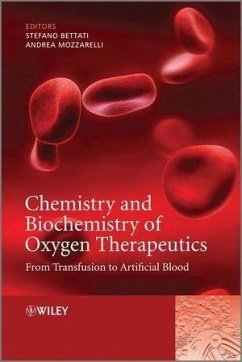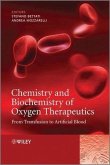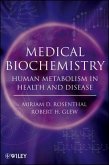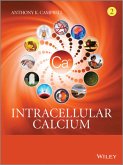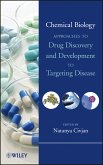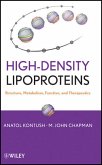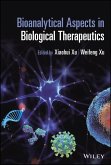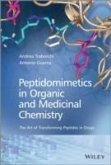Chemistry and Biochemistry of Oxygen Therapeutics (eBook, ePUB)
From Transfusion to Artificial Blood
Redaktion: Mozzarelli, Andrea; Bettati, Stefano


Alle Infos zum eBook verschenken

Chemistry and Biochemistry of Oxygen Therapeutics (eBook, ePUB)
From Transfusion to Artificial Blood
Redaktion: Mozzarelli, Andrea; Bettati, Stefano
- Format: ePub
- Merkliste
- Auf die Merkliste
- Bewerten Bewerten
- Teilen
- Produkt teilen
- Produkterinnerung
- Produkterinnerung

Hier können Sie sich einloggen

Bitte loggen Sie sich zunächst in Ihr Kundenkonto ein oder registrieren Sie sich bei bücher.de, um das eBook-Abo tolino select nutzen zu können.
Human blood performs many important functions including defence against disease and transport of biomolecules, but perhaps the most important is to carry oxygen - the fundamental biochemical fuel - and other blood gases around the cardiovascular system. Traditional therapies for the impairment of this function, or the rapid replacement of lost blood, have centred around blood transfusions. However scientists are developing chemicals (oxygen therapeutics, or "blood substitutes") which have the same oxygen-carrying capability as blood and can be used as replacements for blood transfusion or to…mehr
- Geräte: eReader
- mit Kopierschutz
- eBook Hilfe
- Größe: 10.18MB
![Chemistry and Biochemistry of Oxygen Therapeutics (eBook, PDF) Chemistry and Biochemistry of Oxygen Therapeutics (eBook, PDF)]() Chemistry and Biochemistry of Oxygen Therapeutics (eBook, PDF)140,99 €
Chemistry and Biochemistry of Oxygen Therapeutics (eBook, PDF)140,99 €![Medical Biochemistry (eBook, ePUB) Medical Biochemistry (eBook, ePUB)]() Miriam D. RosenthalMedical Biochemistry (eBook, ePUB)73,99 €
Miriam D. RosenthalMedical Biochemistry (eBook, ePUB)73,99 €![Intracellular Calcium (eBook, ePUB) Intracellular Calcium (eBook, ePUB)]() Anthony K. CampbellIntracellular Calcium (eBook, ePUB)242,99 €
Anthony K. CampbellIntracellular Calcium (eBook, ePUB)242,99 €![Chemical Biology (eBook, ePUB) Chemical Biology (eBook, ePUB)]() Natanya CivjanChemical Biology (eBook, ePUB)120,99 €
Natanya CivjanChemical Biology (eBook, ePUB)120,99 €![High-Density Lipoproteins (eBook, ePUB) High-Density Lipoproteins (eBook, ePUB)]() Anatol KontushHigh-Density Lipoproteins (eBook, ePUB)137,99 €
Anatol KontushHigh-Density Lipoproteins (eBook, ePUB)137,99 €![Bioanalytical Aspects in Biological Therapeutics (eBook, ePUB) Bioanalytical Aspects in Biological Therapeutics (eBook, ePUB)]() Bioanalytical Aspects in Biological Therapeutics (eBook, ePUB)150,99 €
Bioanalytical Aspects in Biological Therapeutics (eBook, ePUB)150,99 €![Peptidomimetics in Organic and Medicinal Chemistry (eBook, ePUB) Peptidomimetics in Organic and Medicinal Chemistry (eBook, ePUB)]() Antonio GuarnaPeptidomimetics in Organic and Medicinal Chemistry (eBook, ePUB)119,99 €
Antonio GuarnaPeptidomimetics in Organic and Medicinal Chemistry (eBook, ePUB)119,99 €-
-
-
Dieser Download kann aus rechtlichen Gründen nur mit Rechnungsadresse in A, B, BG, CY, CZ, D, DK, EW, E, FIN, F, GR, HR, H, IRL, I, LT, L, LR, M, NL, PL, P, R, S, SLO, SK ausgeliefert werden.
- Produktdetails
- Verlag: John Wiley & Sons
- Seitenzahl: 480
- Erscheinungstermin: 7. Juli 2011
- Englisch
- ISBN-13: 9781119976202
- Artikelnr.: 37340104
- Verlag: John Wiley & Sons
- Seitenzahl: 480
- Erscheinungstermin: 7. Juli 2011
- Englisch
- ISBN-13: 9781119976202
- Artikelnr.: 37340104
- Herstellerkennzeichnung Die Herstellerinformationen sind derzeit nicht verfügbar.
Preface xxiii
1. Introduction 1
Richard B. Weiskopf
References 5
Part I. Oxygen: Chemistry, Biochemistry, Physiology and Toxicity 9
2. Hemoglobin Reactivity and Regulation 11
Stefano Bettati and Andrea Mozzarelli
2.1 Introduction 11
2.2 Oxygen Loading and Transport 11
2.3 NO Reactivity with Hb 15
2.4 Hb Oxidation 16
2.5 Nitrite Reactivity with Hb 16
2.6 Amino-acid Determinants of Hb Reactivity:
Natural and Engineered Hbs 17
2.6.1 Modulation of Oxygen Affinity and Cooperativity 17
2.6.2 NO Reactivity and Oxidation 18
2.7 Conclusion 18
Acknowledgments 19
References 19
3. The Major Physiological Control Mechanisms of Blood Flow and Oxygen
Delivery 23
Raymond C. Koehler
3.1 Introduction 23
3.2 Autoregulation of Blood Flow to Changes in Perfusion Pressure 23
3.3 Metabolic Regulation of Blood Flow 26
3.4 O2 Transport 27
3.5 O2 Delivery 27
3.6 Endothelial Control of Vasomotor Tone 29
3.7 Effect of Cell-free Hb on Endothelial Function 31
3.8 Hypoxic Hypoxia 33
3.9 Carbon Monoxide Hypoxia 36
3.10 Anemia 36
3.11 Conclusion 39
References 39
4. The Main Players: Hemoglobin and Myoglobin; Nitric Oxide and Oxygen 47
Tim J. McMahon and Joseph Bonaventura
4.1 Introduction 47
4.2 Role of Mammalian Mb in O2 Homeostasis 47
4.3 What's Missing in the Mb Knockout Mouse 48
4.4 Evolutionary Origins of Mb and the Nitrogen Cycle 49
4.5 Human Hb: Evolved Sensor of pO2 and Redox 49
4.6 Broad Reactivity and Influence of NO: Lessons from the Microcosm Hb 49
4.7 Some Fish Demonstrate a Fundamental "Need" for Hb-dependent NO Cycling,
as in Humans 50
4.8 Reactions of NO with Hb that Preserve NO Bioactivity 52
4.9 Mammalian RBC/Hb-NO Interactions 52
4.10 A Mutant Mouse Challenges the SNO-Hb Hypothesis, but does not
Overthrow it 54
4.11 Signaling by Hb-derived SNO: A Metabolically Responsive, Regulated
Pathway 54
4.12 Signaling by Hb-derived SNO: Pathway Complexity Revealed by Multiple
Defects in Disease States 55
4.13 Therapeutic Implications of the Hb-NO Signaling System 56
4.14 HBOCs, NO, and SNO 56
4.15 Other Gaseous Hb Ligands of Potential Therapeutic Significance 57
4.16 NO-related Enzymatic Activities of Hb: Reconciling Nitrite Reductase
and SNO Synthase Functions 57
4.17 Measuring Biologically Relevant Hb-NO Adducts 58
4.18 Conclusion 58
Acknowledgments 58
References 59
5. The Role of Reactive Oxygen and Nitrogen Species in Ischemia/Reperfusion
Injury 63
Ester Spagnolli and Warren M. Zapol
5.1 Introduction 63
5.2 Redox System and Free Radicals in Biological Systems 64
5.3 Pathophysiology of Ischemia/Reperfusion Injury 65
5.3.1 Cell Death 65
5.3.2 The Inflammatory Response 67
5.4 Protection Against I/R Injury 67
5.4.1 Ischemic Pre- and Post-conditioning 67
5.4.2 Pharmacological Conditioning 68
5.4.2.1 The Protective Role of ROS and Antioxidants 68
5.4.2.2 The Protective Role of NO 69
5.4.2.3 NO-based Therapies for I/R Injury 70
5.5 Conclusion 72
Acknowledgments 72
References 72
Part II. Medical Needs for Oxygen Supply 79
6. Acute Traumatic Hemorrhage and Anemia 81
Lena M. Napolitano
6.1 Introduction 81
6.2 Blood Transfusion in Trauma 83
6.2.1 Massive Transfusion 83
6.2.2 Massive Transfusion and Coagulopathy 83
6.2.3 Hypotensive or Delayed Resuscitation 84
6.2.4 Hemostatic Resuscitation 84
6.2.5 Massive Transfusion Protocols 86
6.2.6 Transfusion after Hemorrhage Control 86
6.2.7 Efficacy of RBC Transfusion in Trauma and Associated Risks 86
6.3 Oxygen Therapeutics in Trauma 88
6.3.1 Diaspirin Crosslinked Hb 90
6.3.2 Hemopure 90
6.3.3 PolyHeme 91
6.3.4 MP4OX 93
6.3.5 Recombinant Human Hb 95
6.3.6 Adverse Effects of HBOCs 95
6.3.7 HBOCs in Trauma: A Way Forward? 96
6.4 Conclusion 97
References 97
7. Diagnosis and Treatment of Haemorrhages in 'Nonsurgical' Patients 107
Umberto Rossi and Rosa Chianese
7.1 Introduction 107
7.1.1 Aetiopathogenetic Classification 107
7.1.2 Multifactorial Pathogenesis 108
7.1.3 Haemorrhagic Syndromes from Antithrombotic Treatment or Prophylaxis
108
7.2 Clinical Assessment 111
7.2.1 Medical History 111
7.2.2 Physical Examination 112
7.3 Laboratory Tests 113
7.3.1 Screening Tests 113
7.3.2 Second-level Laboratory Tests 113
7.3.3 Other Tests 114
7.4 Haemorrhagic Syndromes Clinically Indicative of Systemic Defects with
Normal Screening Tests 117
7.5 Blood and Blood Components in the Treatment of Haemorrhagic Syndromes
118
Further Reading 118
8. Management of Perioperative Bleeding 121
Sibylle A. Kozek-Langenecker
8.1 Introduction 121
8.2 Pathomechanisms of Coagulopathy in Massive Bleeding 121
8.3 Perioperative Coagulation Monitoring 122
8.4 Limitations of Routine Coagulation Tests in the Perioperative Setting
123
8.5 Thromboelastography (TEG) and Rotational Thromboelastometry (ROTEM) 124
8.6 Procoagulant Interventions 124
8.7 Algorithm for Coagulation Management 126
References 127
9. Oxygenation in the Preterm Neonate 131
Vidheya Venkatesh, Priya Muthukumar, Anna Curley and Simon Stanworth
9.1 Introduction 131
9.2 Physiology of Oxygen Transport in Fetal and Postnatal Life 132
9.2.1 Oxygenation of the Fetus 132
9.2.2 Measuring Oxygenation in the Neonate 133
9.3 Oxygen Therapy in the Postnatal Period 133
9.3.1 Oxidative Stresses in the Newborn Period 134
9.3.2 Clinical Sequelae of Hyperoxia 134
9.3.2.1 Retinopathy of Prematurity 134
9.3.2.2 Oxygen and Chronic Lung Disease 135
9.3.2.3 Oxygen and Periventricular Leukomalacia 136
9.4 Oxygen and Resuscitation of the Newborn Infant 136
9.5 Transfusion in the Newborn 137
9.6 ROP and Transfusions 137
9.7 Conclusion 137
References 138
10. Ischemia 145
Hooman Mirzakhani and Ala Nozari
10.1 Introduction 145
10.2 Pathophysiology 145
10.2.1 Energy Failure 145
10.2.2 Cell Membrane Damage 146
10.2.3 Increased Cytosolic Calcium 146
10.2.4 Inflammation 148
10.2.5 The No-reflow Phenomenon 149
10.2.6 Free Radicals and Reactive Oxygen Species 149
10.2.7 Excitotoxicity 150
10.3 Therapeutic Potentials 150
10.3.1 Preconditioning 150
10.3.2 Antioxidants 151
10.3.3 Anti-inflammation Therapy 151
10.3.4 Therapeutic Hypothermia 151
10.3.5 Hydrogen Sulfide 152
10.3.6 Hyperoxia and Hyperbaric Oxygen 152
10.3.7 Hemoglobin-based Oxygen Carriers 152
10.4 Conclusion 153
References 153
11. Normobaric and Hyperbaric Oxygen Therapy for Ischemic Stroke and Other
Neurological Conditions 159
Ari Moskowitz, Yu-Feng Yvonne Chan and Aneesh B. Singhal
11.1 Introduction 159
11.2 Rationale of Oxygen Therapy in AIS 160
11.3 Hyperbaric Oxygen Therapy 162
11.4 Normobaric Oxygen Therapy 164
11.5 The Status of Supplemental Oxygen Delivery 165
11.6 Comparison of HBO and NBO in AIS 165
11.7 Safety Concerns 168
11.8 HBO and NBO in Other Conditions 169
11.9 Conclusion 169
References 170
12. Transfusion Therapy in ß Thalassemia and Sickle Cell Disease 179
Carlo Brugnara and Lucia De Franceschi
12.1 Introduction 179
12.2 ß Thalassemia and Transfusion 179
12.3 Sickle Cell Disease and Transfusion 182
12.4 Iron Chelation Tools 185
12.5 Conclusion 186
References 186
Part III. "Old" and New Strategies for Oxygen Supply 193
13. Transfusion: Political, Administrative and Logistic Issues 195
John R. Hess and Giuliano Grazzini
Disclaimer 195
13.1 Introduction 195
13.2 Blood Safety 196
13.3 Blood Availability 198
13.4 Cost and Fairness 200
13.5 Transfusion Medicine 201
References 202
14. Conscientious Objection in Patient Blood Management 205
Kenneth E. Nollet and Hitoshi Ohto
14.1 Introduction 205
14.2 Conscientious Objection 205
14.3 Patient Blood Management 206
14.4 Jehovah's Witnesses 207
14.5 Will the Real Objection Please Stand Up? 208
14.6 Conscientious Objection in Relation to Oxygen Therapeutics and Other
Innovations 208
Acknowledgements 209
References 210
15. Red-cell Transfusion in Clinical Practice 213
Harvey G. Klein
15.1 Introduction 213
15.2 Red-cell Use 214
15.3 The Red-cell-transfusion Trigger 215
15.4 Risks of Red-cell Transfusion 216
15.5 Conclusion 218
Disclaimer 218
References 218
16. Causes and Consequences of Red Cell Incompatibility 221
Chisa Yamada and Robertson Davenport
16.1 Introduction 221
16.2 Red Cell Antigens 221
16.2.1 ABO and the H System 221
16.2.2 The Lewis System and Structurally Related Antigens 222
16.2.3 The Rh System 222
16.2.4 Other Blood Group Systems 222
16.3 Red Cell Antibodies 223
16.3.1 Naturally Occurring Antibodies and Immune Antibodies 223
16.3.2 Autoantibodies 224
16.3.3 Drug Induced Antibodies 224
16.4 Compatibility Testing 224
16.4.1 ABO and Rh D Typing 224
16.4.2 Antibody Screening and Identification 224
16.4.3 Selection of Appropriate Blood 225
16.4.4 Crossmatch Testing 225
16.5 Hemolytic Transfusion Reactions 225
16.5.1 Pathophysiology 226
16.5.2 Prevention 228
References 228
17. Biochemistry of Storage of Red Blood Cells 231
Ryan Stapley, Dario A. Vitturi and Rakesh P. Patel
17.1 Introduction 231
17.2 Pathologic Consequences of Transfusion with Aged RBCs 232
17.3 Changes in Oxygen Affinity During RBC Storage 232
17.4 Role of Oxidative Damage During RBC Storage 233
17.5 Changes in the Physical Properties of RBCs During Storage 234
17.6 RBCs as Modulators of Vascular Flow 234
17.6.1 ATP Release Hypothesis 234
17.6.2 SNO-hemoglobin Hypothesis 235
17.6.3 Nitrite Reductase/Anhydrase Hypothesis 236
17.7 RBC-dependent Modulation of Inflammation 237
17.8 Conclusion 237
Acknowledgements 238
References 238
18. Proteomic Investigations of Stored Red Blood Cells 243
Lello Zolla and Angelo D'Alessandro
18.1 Introduction 243
18.2 RBC Ageing and Metabolism in vivo 244
18.3 RBC Storage Lesions Through Proteomics 248
18.4 Conclusion 252
References 252
19. Red Blood Cells from Stem Cells 257
Anna Rita Migliaccio, Carolyn Whitsett and Giovanni Migliaccio
19.1 Introduction 257
19.2 Stem-cell Sources for ex vivo Generation of Erythroid Cells as a
Transfusion Product 258
19.3 Conditions that Favor ex vivo Erythroid Cell Expansion 260
19.4 A Clinical-grade Production Process for ex vivo Generation of Red-cell
Transfusion Products 261
19.4.1 The Nature of the Production Process 261
19.4.2 Cellular Composition of the Product 263
19.4.3 Functional Status of Product 264
19.4.4 Safety Considerations 265
19.5 Time Line of the Clinical Application of ex vivo-generated Erythroid
Cells 266
19.5.1 Drug Discovery 266
19.5.2 Drug Delivery 267
19.5.3 Ex vivo-expanded EBs for Alloimmunized Patients 268
References 268
20. The Universal Red Blood Cell 273
Luca Ronda and Serena Faggiano
20.1 Introduction 273
20.1.1 ABO Antigens 274
20.1.2 The Rh System 274
20.2 Enzymatic Removal of A and B Antigens 275
20.2.1 Conversion of B RBCs to Group O 275
20.2.2 Conversion of A RBCs to Group O 277
20.3 RBC Camouflage Through PEGylation 277
20.3.1 Functionalized Methoxy PEG 278
20.3.2 Cyanuric Chloride PEG 279
20.3.3 Extension Arm-facilitated RBC PEGylation 279
20.3.4 Increasing the Degree of RBC PEGylation 280
20.4 Conclusion 280
References 280
21. Allosteric Effectors of Hemoglobin: Past, Present and Future 285
Martin K. Safo and Stefano Bruno
21.1 Introduction 285
21.2 Natural and Synthetic Allosteric Effectors 288
21.2.1 Organic Phosphates 288
21.2.2 Synthetic Aromatic Propionate Right-shifters 289
21.2.3 Aromatic Aldehyde Left-shifters 290
21.3 Molecular Mechanism of Action of Allosteric Effectors 293
21.3.1 Oxygen Binding Curve and Hb Structural Changes 293
21.3.2 How Allosteric Effectors can Bind to the Same Site and Have Opposite
Allosteric Properties 294
21.3.3 Decreasing Subunit Mobility and Changes in Allosteric Properties:
Molecular Ratchets 294
21.4 The First Visualization of an Important Pharmacological Theory via Hb
Allosteric Effector Binding 295
21.5 The Clinical Importance of Hemoglobin Allosteric Effectors 295
References 296
22. Hemoglobin-based Oxygen Carriers: History, Limits, Brief Summary of the
State of the Art, Including Clinical Trials 301
Jonathan S. Jahr, Arezou Sadighi, Linzy Doherty, Alvin Li and Hae Won Kim
22.1 Introduction 301
22.2 American Society of Anesthesiologists Guidelines and Risks of Blood
Transfusion 302
22.3 Limitations of Blood Transfusion 302
22.4 History 302
22.5 Development 303
22.6 Definitive Clinical Trials 304
22.6.1 Diaspirin Crosslinked Hemoglobin (DCLHb, HemeAssist, Baxter
Laboratories, Deerfield, IL) 304
22.6.2 Hemoglobin Raffimer (HR, Hemolink, Hemosol Inc., Ontario, Canada)
306
22.6.3 Human Polymerized Hemoglobin (PolyHeme, Northfield Laboratories,
Evanston, IL) 307 22.6.4 Hemoglobin Glutamer-250 (Bovine) (HBOC-201,
Hemopure, Biopure Corp., Cambridge, MA) 308
22.6.5 Maleimide-polyethylene Glycol-modified Hemoglobin (MP4, Hemospan,
Sangart Inc., San Diego, CA) 309
22.7 Current Status and Future Directions of HBOCs 311
References 314
23. Oxygen Delivery by Natural and Artificial Oxygen Carriers 317
Enrico Bucci
23.1 Introduction 317
23.2 The Role of Oxygen Carriers 317
23.3 The Role of Natural Cell-bound Oxygen Carriers 318
23.4 Matching the Rate of Oxygen Delivery with the Rate of Oxygen
Consumption 320
23.4.1 The Imbalance 320
23.4.2 The Rate of Oxygen Release from the Red Cells 320
23.4.3 Matching the Delivery/Consumption Rates 321
23.4.4 The Hematocrit is a Critical Parameter 321
23.5 The Role of Artificial Cell-free Oxygen Carriers 321
23.5.1 Facilitated Diffusion 321
23.5.2 Toxicity 322
23.6 Other Parameters 322
23.7 Clinical Use? 323
Acknowledgments 324
References 324
24. Crosslinked and Polymerized Hemoglobins as Potential Blood Substitutes
327
Kenneth W. Olsen and Eugene Tarasov
24.1 Introduction 327
24.2 Crosslinking the Hb Tetramer 328
24.3 Hb Polymers 332
24.4 Conclusion 337
References 338
25. Engineering the Molecular Shape of PEG-Hemoglobin Adducts for
Supraperfusion 345
Seetharama A. Acharya, Marcos Intaglietta, Amy G. Tsai, Kulal Ananda and
Fantao Meng
25.1 Introduction 345
25.2 Enzon DecaPEGylated Bovine Hb is Nonhypertensive 346
25.3 EAF HexaPEGylated Hb (EAF P5K6-Hb) is Nonhypertensive 347
25.4 Molecular and Solution Properties of EAF HexaPEGylated Human Hb
(EAF-P5K6-Hb) 347
25.5 High O2 Affinity of EAF HexaPEGylated Hb and Tissue Oxygenation in
Extreme Hemodilution 349
25.6 Influence of Total PEG Mass Conjugated to Hb on O2 Affinity and Tissue
Oxygenation by PEG-Hbs 350
25.7 Influence of PEGylation Chemistry on Structural, Functional, and
Solution Properties of HexaPEGylated Hb 351
25.8 Reductive PEGylation-induced Weakening of Interdimeric Interactions of
Tetrameric Hbs 352
25.9 PEGylation-promoted Dissociation of Hb Tetramer is Attenuated by the
Extension Arms of EAF PEGylated Hbs 353
25.10 Does Urethane-linkage-mediated PEGylation of Hb Promote its
Dissociation? 354
25.11 Hemospan: Prototype of EAF HexaPEGylated Hb Designed at Einstein 354
25.12 EAF HexaPEGylated Hb Compared to other Blood Substitutes of Earlier
Designs 355
25.13 Reversible Protection of Cys-93(ß) during EAF PEGylation of Hb and
Crosslinked Hbs: A Structural Requirement to Generate Medium- and
Low-O2-affinity PEG-Hbs 355
25.14 Engineering Extension Arms between the Protein Core and PEG Shell
Attenuates PEGylation-promoted Tetramer Dissociation 356
25.15 Attenuation of Direct HexaPEGylation-promoted Dissociation of Hb
Tetramers by Increasing the Tetramer Stability Through Chemical
Modification 359
25.16 Influence of the Extension Arm on the HexaPEGylation-enhanced Thermal
Stability of Hb 359
25.17 PEGylation of Hb Induces a Hydrostatic Molecular Drag to the PEG-Hb
Conjugate 360
25.18 EAF HexaPEGylated Hb is a Superperfusion Agent 360
25.19 EAF PEG-Hb-induced Vasodilation 361
25.20 In vivo Vasodilation by EAF PEG-Hb through its Enhanced Nitrite
Reductase Activity 361
25.21 EAF PEG-Hbs as Mechanotransducers of e-NOS Activity 363
25.22 The Pattern of PEGylation of Intramolecularly Crosslinked Hbs
Influences the Viscosity of the PEG-Hb Solution 364
25.23 Conclusion 364
Acknowledgments 366
References 367
26. Hb Octamers by Introduction of Surface Cysteines 371
V¿eronique Baudin-Creuza, Chien Ho and Michael C. Marden
26.1 Introduction 371
26.2 Genetic Engineering of Proteins with Cysteines 373
26.2.1 Protein Expression 373
26.2.2 Oligomer Size 374
26.2.3 Disulfide Bond Formation 375
26.2.4 Functional Properties of the Octamers 376
26.2.5 Octamer Properties 378
26.2.6 Octamer Constraint 378
26.3 Conclusion 378
References 378
27. Hemoglobin Vesicles as a Cellular-type Hemoglobin-based Oxygen Carrier
381
Hiromi Sakai, Hirohisa Horinouchi, Eishun Tsuchida and Koichi Kobayashi
27.1 Introduction 381
27.2 The Concept of Hb Encapsulation in Liposomes 382
27.3 Hb Encapsulation Retards Gas Reactions 383
27.4 HBOCs as a Carrier of not only O2 but also CO 385
27.5 Conclusion 387
Acknowledgments 387
References 387
28. Animal Models and Oxidative Biomarkers to Evaluate Preclinical Safety
of Extracellular Hemoglobins 391
Paul W. Buehler and Felice D'Agnillo
Disclaimer 391
28.1 Introduction 391
28.2 HBOC Safety and Efficacy 392
28.2.1 Proposed Mechanisms of Toxicity 392
28.2.1.1 Hypertension 392
28.2.1.2 Oxidative Stress 392
28.2.2 Safety Pharmacology and Toxicology Studies 393
28.2.3 In vivo Models of Efficacy "Proof of Concept" 395
28.2.3.1 Tissue Blood Flow and Oxygenation 395
28.2.3.2 Traumatic Hemorrhage 396
28.2.3.3 Local Ischemia 397
28.2.3.4 Sickle Cell Disease 397
28.2.4 Experimental Approaches to Assessing Preclinical Safety of HBOCs 398
28.2.4.1 Species Antioxidant Status (Natural Evolution) 398
28.2.4.2 Chemically Induced Antioxidant Depletion 398
28.2.4.3 Endothelial Dysfunction 399
28.2.4.4 Sepsis and Endotoxemia 400
28.3 Experimental Oxidative Biomarkers and Extracellular Hb Exposure 400
28.3.1 Heme Iron Oxidation 400
28.3.2 Amino-acid Oxidation 401
28.3.3 Heme Catabolism and Iron Sequestration 401
28.4 Markers of in vivo Oxidative Stress and Tissue Damage 403
28.4.1 4-hydroxy-2-nonenal (4-HNE) Protein Adducts 403
28.4.2 8-hydroxy-2-deoxyguanosine (8-OHdG) 403
28.5 Conclusion 404
References 405
29. Academia-Industry Collaboration in Blood Substitute Development:
Issues, Case Histories and a Proposal 413
Hae Won Kim, Andrea Mozzarelli, Hiromi Sakai and Jonathan S. Jahr
29.1 Introduction 413
29.2 Generic Issues in Academia-Industry Collaboration 414
29.3 Academia-Industry Collaboration in HBOC Development 415
29.4 Proposal for a New Academia-Industry Collaboration Model in HBOC
Development: an HBOC Research Consortium (a Conceptual Model) 417
29.4.1 Mission 417
29.4.2 Guiding Principles 417
29.4.3 Key Objectives 417
29.4.4 Structure 418
29.4.5 Operation 419
29.5 Discussion 420
29.6 Conclusions 421
Appendix: Successful Academia-Industry Collaboration Cases in HBOC
Development 422
Case A: Waseda-Keio-Industry Research Collaboration 422
Case B: EuroBloodSubstitutes Consortium 424
References 426
Index 429
Preface xxiii
1. Introduction 1
Richard B. Weiskopf
References 5
Part I. Oxygen: Chemistry, Biochemistry, Physiology and Toxicity 9
2. Hemoglobin Reactivity and Regulation 11
Stefano Bettati and Andrea Mozzarelli
2.1 Introduction 11
2.2 Oxygen Loading and Transport 11
2.3 NO Reactivity with Hb 15
2.4 Hb Oxidation 16
2.5 Nitrite Reactivity with Hb 16
2.6 Amino-acid Determinants of Hb Reactivity:
Natural and Engineered Hbs 17
2.6.1 Modulation of Oxygen Affinity and Cooperativity 17
2.6.2 NO Reactivity and Oxidation 18
2.7 Conclusion 18
Acknowledgments 19
References 19
3. The Major Physiological Control Mechanisms of Blood Flow and Oxygen
Delivery 23
Raymond C. Koehler
3.1 Introduction 23
3.2 Autoregulation of Blood Flow to Changes in Perfusion Pressure 23
3.3 Metabolic Regulation of Blood Flow 26
3.4 O2 Transport 27
3.5 O2 Delivery 27
3.6 Endothelial Control of Vasomotor Tone 29
3.7 Effect of Cell-free Hb on Endothelial Function 31
3.8 Hypoxic Hypoxia 33
3.9 Carbon Monoxide Hypoxia 36
3.10 Anemia 36
3.11 Conclusion 39
References 39
4. The Main Players: Hemoglobin and Myoglobin; Nitric Oxide and Oxygen 47
Tim J. McMahon and Joseph Bonaventura
4.1 Introduction 47
4.2 Role of Mammalian Mb in O2 Homeostasis 47
4.3 What's Missing in the Mb Knockout Mouse 48
4.4 Evolutionary Origins of Mb and the Nitrogen Cycle 49
4.5 Human Hb: Evolved Sensor of pO2 and Redox 49
4.6 Broad Reactivity and Influence of NO: Lessons from the Microcosm Hb 49
4.7 Some Fish Demonstrate a Fundamental "Need" for Hb-dependent NO Cycling,
as in Humans 50
4.8 Reactions of NO with Hb that Preserve NO Bioactivity 52
4.9 Mammalian RBC/Hb-NO Interactions 52
4.10 A Mutant Mouse Challenges the SNO-Hb Hypothesis, but does not
Overthrow it 54
4.11 Signaling by Hb-derived SNO: A Metabolically Responsive, Regulated
Pathway 54
4.12 Signaling by Hb-derived SNO: Pathway Complexity Revealed by Multiple
Defects in Disease States 55
4.13 Therapeutic Implications of the Hb-NO Signaling System 56
4.14 HBOCs, NO, and SNO 56
4.15 Other Gaseous Hb Ligands of Potential Therapeutic Significance 57
4.16 NO-related Enzymatic Activities of Hb: Reconciling Nitrite Reductase
and SNO Synthase Functions 57
4.17 Measuring Biologically Relevant Hb-NO Adducts 58
4.18 Conclusion 58
Acknowledgments 58
References 59
5. The Role of Reactive Oxygen and Nitrogen Species in Ischemia/Reperfusion
Injury 63
Ester Spagnolli and Warren M. Zapol
5.1 Introduction 63
5.2 Redox System and Free Radicals in Biological Systems 64
5.3 Pathophysiology of Ischemia/Reperfusion Injury 65
5.3.1 Cell Death 65
5.3.2 The Inflammatory Response 67
5.4 Protection Against I/R Injury 67
5.4.1 Ischemic Pre- and Post-conditioning 67
5.4.2 Pharmacological Conditioning 68
5.4.2.1 The Protective Role of ROS and Antioxidants 68
5.4.2.2 The Protective Role of NO 69
5.4.2.3 NO-based Therapies for I/R Injury 70
5.5 Conclusion 72
Acknowledgments 72
References 72
Part II. Medical Needs for Oxygen Supply 79
6. Acute Traumatic Hemorrhage and Anemia 81
Lena M. Napolitano
6.1 Introduction 81
6.2 Blood Transfusion in Trauma 83
6.2.1 Massive Transfusion 83
6.2.2 Massive Transfusion and Coagulopathy 83
6.2.3 Hypotensive or Delayed Resuscitation 84
6.2.4 Hemostatic Resuscitation 84
6.2.5 Massive Transfusion Protocols 86
6.2.6 Transfusion after Hemorrhage Control 86
6.2.7 Efficacy of RBC Transfusion in Trauma and Associated Risks 86
6.3 Oxygen Therapeutics in Trauma 88
6.3.1 Diaspirin Crosslinked Hb 90
6.3.2 Hemopure 90
6.3.3 PolyHeme 91
6.3.4 MP4OX 93
6.3.5 Recombinant Human Hb 95
6.3.6 Adverse Effects of HBOCs 95
6.3.7 HBOCs in Trauma: A Way Forward? 96
6.4 Conclusion 97
References 97
7. Diagnosis and Treatment of Haemorrhages in 'Nonsurgical' Patients 107
Umberto Rossi and Rosa Chianese
7.1 Introduction 107
7.1.1 Aetiopathogenetic Classification 107
7.1.2 Multifactorial Pathogenesis 108
7.1.3 Haemorrhagic Syndromes from Antithrombotic Treatment or Prophylaxis
108
7.2 Clinical Assessment 111
7.2.1 Medical History 111
7.2.2 Physical Examination 112
7.3 Laboratory Tests 113
7.3.1 Screening Tests 113
7.3.2 Second-level Laboratory Tests 113
7.3.3 Other Tests 114
7.4 Haemorrhagic Syndromes Clinically Indicative of Systemic Defects with
Normal Screening Tests 117
7.5 Blood and Blood Components in the Treatment of Haemorrhagic Syndromes
118
Further Reading 118
8. Management of Perioperative Bleeding 121
Sibylle A. Kozek-Langenecker
8.1 Introduction 121
8.2 Pathomechanisms of Coagulopathy in Massive Bleeding 121
8.3 Perioperative Coagulation Monitoring 122
8.4 Limitations of Routine Coagulation Tests in the Perioperative Setting
123
8.5 Thromboelastography (TEG) and Rotational Thromboelastometry (ROTEM) 124
8.6 Procoagulant Interventions 124
8.7 Algorithm for Coagulation Management 126
References 127
9. Oxygenation in the Preterm Neonate 131
Vidheya Venkatesh, Priya Muthukumar, Anna Curley and Simon Stanworth
9.1 Introduction 131
9.2 Physiology of Oxygen Transport in Fetal and Postnatal Life 132
9.2.1 Oxygenation of the Fetus 132
9.2.2 Measuring Oxygenation in the Neonate 133
9.3 Oxygen Therapy in the Postnatal Period 133
9.3.1 Oxidative Stresses in the Newborn Period 134
9.3.2 Clinical Sequelae of Hyperoxia 134
9.3.2.1 Retinopathy of Prematurity 134
9.3.2.2 Oxygen and Chronic Lung Disease 135
9.3.2.3 Oxygen and Periventricular Leukomalacia 136
9.4 Oxygen and Resuscitation of the Newborn Infant 136
9.5 Transfusion in the Newborn 137
9.6 ROP and Transfusions 137
9.7 Conclusion 137
References 138
10. Ischemia 145
Hooman Mirzakhani and Ala Nozari
10.1 Introduction 145
10.2 Pathophysiology 145
10.2.1 Energy Failure 145
10.2.2 Cell Membrane Damage 146
10.2.3 Increased Cytosolic Calcium 146
10.2.4 Inflammation 148
10.2.5 The No-reflow Phenomenon 149
10.2.6 Free Radicals and Reactive Oxygen Species 149
10.2.7 Excitotoxicity 150
10.3 Therapeutic Potentials 150
10.3.1 Preconditioning 150
10.3.2 Antioxidants 151
10.3.3 Anti-inflammation Therapy 151
10.3.4 Therapeutic Hypothermia 151
10.3.5 Hydrogen Sulfide 152
10.3.6 Hyperoxia and Hyperbaric Oxygen 152
10.3.7 Hemoglobin-based Oxygen Carriers 152
10.4 Conclusion 153
References 153
11. Normobaric and Hyperbaric Oxygen Therapy for Ischemic Stroke and Other
Neurological Conditions 159
Ari Moskowitz, Yu-Feng Yvonne Chan and Aneesh B. Singhal
11.1 Introduction 159
11.2 Rationale of Oxygen Therapy in AIS 160
11.3 Hyperbaric Oxygen Therapy 162
11.4 Normobaric Oxygen Therapy 164
11.5 The Status of Supplemental Oxygen Delivery 165
11.6 Comparison of HBO and NBO in AIS 165
11.7 Safety Concerns 168
11.8 HBO and NBO in Other Conditions 169
11.9 Conclusion 169
References 170
12. Transfusion Therapy in ß Thalassemia and Sickle Cell Disease 179
Carlo Brugnara and Lucia De Franceschi
12.1 Introduction 179
12.2 ß Thalassemia and Transfusion 179
12.3 Sickle Cell Disease and Transfusion 182
12.4 Iron Chelation Tools 185
12.5 Conclusion 186
References 186
Part III. "Old" and New Strategies for Oxygen Supply 193
13. Transfusion: Political, Administrative and Logistic Issues 195
John R. Hess and Giuliano Grazzini
Disclaimer 195
13.1 Introduction 195
13.2 Blood Safety 196
13.3 Blood Availability 198
13.4 Cost and Fairness 200
13.5 Transfusion Medicine 201
References 202
14. Conscientious Objection in Patient Blood Management 205
Kenneth E. Nollet and Hitoshi Ohto
14.1 Introduction 205
14.2 Conscientious Objection 205
14.3 Patient Blood Management 206
14.4 Jehovah's Witnesses 207
14.5 Will the Real Objection Please Stand Up? 208
14.6 Conscientious Objection in Relation to Oxygen Therapeutics and Other
Innovations 208
Acknowledgements 209
References 210
15. Red-cell Transfusion in Clinical Practice 213
Harvey G. Klein
15.1 Introduction 213
15.2 Red-cell Use 214
15.3 The Red-cell-transfusion Trigger 215
15.4 Risks of Red-cell Transfusion 216
15.5 Conclusion 218
Disclaimer 218
References 218
16. Causes and Consequences of Red Cell Incompatibility 221
Chisa Yamada and Robertson Davenport
16.1 Introduction 221
16.2 Red Cell Antigens 221
16.2.1 ABO and the H System 221
16.2.2 The Lewis System and Structurally Related Antigens 222
16.2.3 The Rh System 222
16.2.4 Other Blood Group Systems 222
16.3 Red Cell Antibodies 223
16.3.1 Naturally Occurring Antibodies and Immune Antibodies 223
16.3.2 Autoantibodies 224
16.3.3 Drug Induced Antibodies 224
16.4 Compatibility Testing 224
16.4.1 ABO and Rh D Typing 224
16.4.2 Antibody Screening and Identification 224
16.4.3 Selection of Appropriate Blood 225
16.4.4 Crossmatch Testing 225
16.5 Hemolytic Transfusion Reactions 225
16.5.1 Pathophysiology 226
16.5.2 Prevention 228
References 228
17. Biochemistry of Storage of Red Blood Cells 231
Ryan Stapley, Dario A. Vitturi and Rakesh P. Patel
17.1 Introduction 231
17.2 Pathologic Consequences of Transfusion with Aged RBCs 232
17.3 Changes in Oxygen Affinity During RBC Storage 232
17.4 Role of Oxidative Damage During RBC Storage 233
17.5 Changes in the Physical Properties of RBCs During Storage 234
17.6 RBCs as Modulators of Vascular Flow 234
17.6.1 ATP Release Hypothesis 234
17.6.2 SNO-hemoglobin Hypothesis 235
17.6.3 Nitrite Reductase/Anhydrase Hypothesis 236
17.7 RBC-dependent Modulation of Inflammation 237
17.8 Conclusion 237
Acknowledgements 238
References 238
18. Proteomic Investigations of Stored Red Blood Cells 243
Lello Zolla and Angelo D'Alessandro
18.1 Introduction 243
18.2 RBC Ageing and Metabolism in vivo 244
18.3 RBC Storage Lesions Through Proteomics 248
18.4 Conclusion 252
References 252
19. Red Blood Cells from Stem Cells 257
Anna Rita Migliaccio, Carolyn Whitsett and Giovanni Migliaccio
19.1 Introduction 257
19.2 Stem-cell Sources for ex vivo Generation of Erythroid Cells as a
Transfusion Product 258
19.3 Conditions that Favor ex vivo Erythroid Cell Expansion 260
19.4 A Clinical-grade Production Process for ex vivo Generation of Red-cell
Transfusion Products 261
19.4.1 The Nature of the Production Process 261
19.4.2 Cellular Composition of the Product 263
19.4.3 Functional Status of Product 264
19.4.4 Safety Considerations 265
19.5 Time Line of the Clinical Application of ex vivo-generated Erythroid
Cells 266
19.5.1 Drug Discovery 266
19.5.2 Drug Delivery 267
19.5.3 Ex vivo-expanded EBs for Alloimmunized Patients 268
References 268
20. The Universal Red Blood Cell 273
Luca Ronda and Serena Faggiano
20.1 Introduction 273
20.1.1 ABO Antigens 274
20.1.2 The Rh System 274
20.2 Enzymatic Removal of A and B Antigens 275
20.2.1 Conversion of B RBCs to Group O 275
20.2.2 Conversion of A RBCs to Group O 277
20.3 RBC Camouflage Through PEGylation 277
20.3.1 Functionalized Methoxy PEG 278
20.3.2 Cyanuric Chloride PEG 279
20.3.3 Extension Arm-facilitated RBC PEGylation 279
20.3.4 Increasing the Degree of RBC PEGylation 280
20.4 Conclusion 280
References 280
21. Allosteric Effectors of Hemoglobin: Past, Present and Future 285
Martin K. Safo and Stefano Bruno
21.1 Introduction 285
21.2 Natural and Synthetic Allosteric Effectors 288
21.2.1 Organic Phosphates 288
21.2.2 Synthetic Aromatic Propionate Right-shifters 289
21.2.3 Aromatic Aldehyde Left-shifters 290
21.3 Molecular Mechanism of Action of Allosteric Effectors 293
21.3.1 Oxygen Binding Curve and Hb Structural Changes 293
21.3.2 How Allosteric Effectors can Bind to the Same Site and Have Opposite
Allosteric Properties 294
21.3.3 Decreasing Subunit Mobility and Changes in Allosteric Properties:
Molecular Ratchets 294
21.4 The First Visualization of an Important Pharmacological Theory via Hb
Allosteric Effector Binding 295
21.5 The Clinical Importance of Hemoglobin Allosteric Effectors 295
References 296
22. Hemoglobin-based Oxygen Carriers: History, Limits, Brief Summary of the
State of the Art, Including Clinical Trials 301
Jonathan S. Jahr, Arezou Sadighi, Linzy Doherty, Alvin Li and Hae Won Kim
22.1 Introduction 301
22.2 American Society of Anesthesiologists Guidelines and Risks of Blood
Transfusion 302
22.3 Limitations of Blood Transfusion 302
22.4 History 302
22.5 Development 303
22.6 Definitive Clinical Trials 304
22.6.1 Diaspirin Crosslinked Hemoglobin (DCLHb, HemeAssist, Baxter
Laboratories, Deerfield, IL) 304
22.6.2 Hemoglobin Raffimer (HR, Hemolink, Hemosol Inc., Ontario, Canada)
306
22.6.3 Human Polymerized Hemoglobin (PolyHeme, Northfield Laboratories,
Evanston, IL) 307 22.6.4 Hemoglobin Glutamer-250 (Bovine) (HBOC-201,
Hemopure, Biopure Corp., Cambridge, MA) 308
22.6.5 Maleimide-polyethylene Glycol-modified Hemoglobin (MP4, Hemospan,
Sangart Inc., San Diego, CA) 309
22.7 Current Status and Future Directions of HBOCs 311
References 314
23. Oxygen Delivery by Natural and Artificial Oxygen Carriers 317
Enrico Bucci
23.1 Introduction 317
23.2 The Role of Oxygen Carriers 317
23.3 The Role of Natural Cell-bound Oxygen Carriers 318
23.4 Matching the Rate of Oxygen Delivery with the Rate of Oxygen
Consumption 320
23.4.1 The Imbalance 320
23.4.2 The Rate of Oxygen Release from the Red Cells 320
23.4.3 Matching the Delivery/Consumption Rates 321
23.4.4 The Hematocrit is a Critical Parameter 321
23.5 The Role of Artificial Cell-free Oxygen Carriers 321
23.5.1 Facilitated Diffusion 321
23.5.2 Toxicity 322
23.6 Other Parameters 322
23.7 Clinical Use? 323
Acknowledgments 324
References 324
24. Crosslinked and Polymerized Hemoglobins as Potential Blood Substitutes
327
Kenneth W. Olsen and Eugene Tarasov
24.1 Introduction 327
24.2 Crosslinking the Hb Tetramer 328
24.3 Hb Polymers 332
24.4 Conclusion 337
References 338
25. Engineering the Molecular Shape of PEG-Hemoglobin Adducts for
Supraperfusion 345
Seetharama A. Acharya, Marcos Intaglietta, Amy G. Tsai, Kulal Ananda and
Fantao Meng
25.1 Introduction 345
25.2 Enzon DecaPEGylated Bovine Hb is Nonhypertensive 346
25.3 EAF HexaPEGylated Hb (EAF P5K6-Hb) is Nonhypertensive 347
25.4 Molecular and Solution Properties of EAF HexaPEGylated Human Hb
(EAF-P5K6-Hb) 347
25.5 High O2 Affinity of EAF HexaPEGylated Hb and Tissue Oxygenation in
Extreme Hemodilution 349
25.6 Influence of Total PEG Mass Conjugated to Hb on O2 Affinity and Tissue
Oxygenation by PEG-Hbs 350
25.7 Influence of PEGylation Chemistry on Structural, Functional, and
Solution Properties of HexaPEGylated Hb 351
25.8 Reductive PEGylation-induced Weakening of Interdimeric Interactions of
Tetrameric Hbs 352
25.9 PEGylation-promoted Dissociation of Hb Tetramer is Attenuated by the
Extension Arms of EAF PEGylated Hbs 353
25.10 Does Urethane-linkage-mediated PEGylation of Hb Promote its
Dissociation? 354
25.11 Hemospan: Prototype of EAF HexaPEGylated Hb Designed at Einstein 354
25.12 EAF HexaPEGylated Hb Compared to other Blood Substitutes of Earlier
Designs 355
25.13 Reversible Protection of Cys-93(ß) during EAF PEGylation of Hb and
Crosslinked Hbs: A Structural Requirement to Generate Medium- and
Low-O2-affinity PEG-Hbs 355
25.14 Engineering Extension Arms between the Protein Core and PEG Shell
Attenuates PEGylation-promoted Tetramer Dissociation 356
25.15 Attenuation of Direct HexaPEGylation-promoted Dissociation of Hb
Tetramers by Increasing the Tetramer Stability Through Chemical
Modification 359
25.16 Influence of the Extension Arm on the HexaPEGylation-enhanced Thermal
Stability of Hb 359
25.17 PEGylation of Hb Induces a Hydrostatic Molecular Drag to the PEG-Hb
Conjugate 360
25.18 EAF HexaPEGylated Hb is a Superperfusion Agent 360
25.19 EAF PEG-Hb-induced Vasodilation 361
25.20 In vivo Vasodilation by EAF PEG-Hb through its Enhanced Nitrite
Reductase Activity 361
25.21 EAF PEG-Hbs as Mechanotransducers of e-NOS Activity 363
25.22 The Pattern of PEGylation of Intramolecularly Crosslinked Hbs
Influences the Viscosity of the PEG-Hb Solution 364
25.23 Conclusion 364
Acknowledgments 366
References 367
26. Hb Octamers by Introduction of Surface Cysteines 371
V¿eronique Baudin-Creuza, Chien Ho and Michael C. Marden
26.1 Introduction 371
26.2 Genetic Engineering of Proteins with Cysteines 373
26.2.1 Protein Expression 373
26.2.2 Oligomer Size 374
26.2.3 Disulfide Bond Formation 375
26.2.4 Functional Properties of the Octamers 376
26.2.5 Octamer Properties 378
26.2.6 Octamer Constraint 378
26.3 Conclusion 378
References 378
27. Hemoglobin Vesicles as a Cellular-type Hemoglobin-based Oxygen Carrier
381
Hiromi Sakai, Hirohisa Horinouchi, Eishun Tsuchida and Koichi Kobayashi
27.1 Introduction 381
27.2 The Concept of Hb Encapsulation in Liposomes 382
27.3 Hb Encapsulation Retards Gas Reactions 383
27.4 HBOCs as a Carrier of not only O2 but also CO 385
27.5 Conclusion 387
Acknowledgments 387
References 387
28. Animal Models and Oxidative Biomarkers to Evaluate Preclinical Safety
of Extracellular Hemoglobins 391
Paul W. Buehler and Felice D'Agnillo
Disclaimer 391
28.1 Introduction 391
28.2 HBOC Safety and Efficacy 392
28.2.1 Proposed Mechanisms of Toxicity 392
28.2.1.1 Hypertension 392
28.2.1.2 Oxidative Stress 392
28.2.2 Safety Pharmacology and Toxicology Studies 393
28.2.3 In vivo Models of Efficacy "Proof of Concept" 395
28.2.3.1 Tissue Blood Flow and Oxygenation 395
28.2.3.2 Traumatic Hemorrhage 396
28.2.3.3 Local Ischemia 397
28.2.3.4 Sickle Cell Disease 397
28.2.4 Experimental Approaches to Assessing Preclinical Safety of HBOCs 398
28.2.4.1 Species Antioxidant Status (Natural Evolution) 398
28.2.4.2 Chemically Induced Antioxidant Depletion 398
28.2.4.3 Endothelial Dysfunction 399
28.2.4.4 Sepsis and Endotoxemia 400
28.3 Experimental Oxidative Biomarkers and Extracellular Hb Exposure 400
28.3.1 Heme Iron Oxidation 400
28.3.2 Amino-acid Oxidation 401
28.3.3 Heme Catabolism and Iron Sequestration 401
28.4 Markers of in vivo Oxidative Stress and Tissue Damage 403
28.4.1 4-hydroxy-2-nonenal (4-HNE) Protein Adducts 403
28.4.2 8-hydroxy-2-deoxyguanosine (8-OHdG) 403
28.5 Conclusion 404
References 405
29. Academia-Industry Collaboration in Blood Substitute Development:
Issues, Case Histories and a Proposal 413
Hae Won Kim, Andrea Mozzarelli, Hiromi Sakai and Jonathan S. Jahr
29.1 Introduction 413
29.2 Generic Issues in Academia-Industry Collaboration 414
29.3 Academia-Industry Collaboration in HBOC Development 415
29.4 Proposal for a New Academia-Industry Collaboration Model in HBOC
Development: an HBOC Research Consortium (a Conceptual Model) 417
29.4.1 Mission 417
29.4.2 Guiding Principles 417
29.4.3 Key Objectives 417
29.4.4 Structure 418
29.4.5 Operation 419
29.5 Discussion 420
29.6 Conclusions 421
Appendix: Successful Academia-Industry Collaboration Cases in HBOC
Development 422
Case A: Waseda-Keio-Industry Research Collaboration 422
Case B: EuroBloodSubstitutes Consortium 424
References 426
Index 429
